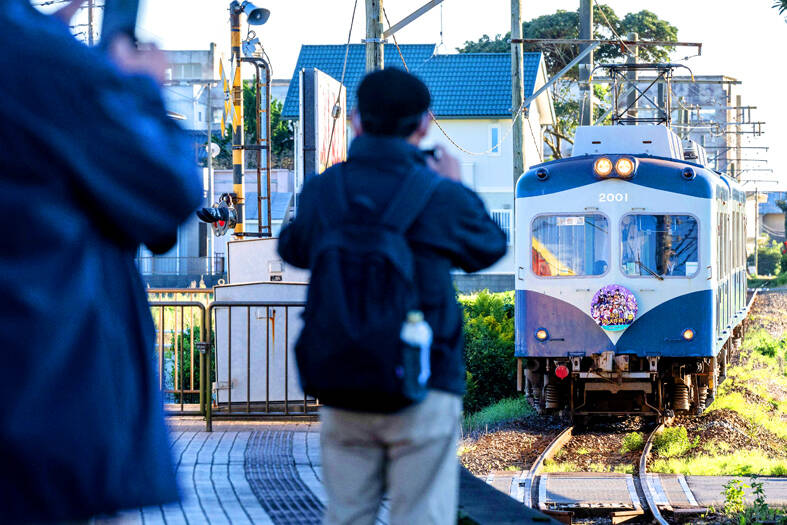In the driver’s seat of a two-car train, Katsunori Takemoto puts on his white gloves and checks the antiquated gauges before setting out alongside cabbage fields in Japan’s rural Chiba.
Like many small railway lines across Japan’s countryside, the 60-year-old trains that ply this route are a loss-maker, but Takemoto has found a way to keep the business afloat.
With a combination of savvy marketing partnerships with pop stars and branded souvenirs, the president of Choshi Electric Railway navigated the firm into the black last year, while helping promote the local region.

Photo: AFP
“I feel strongly that this is the mission of all local trains. We want to serve as advertising vehicles for communities,” Takemoto told reporters. “Towns without trains wither away. So rebuilding rural trains must be done as part of rebuilding communities.”
However, the 99-year-old business he took over in 2011 is the exception rather than the rule in Japan, home to hundreds of loss-making rural rail lines. Depopulation, vehicle ownership, freight trucking and the COVID-19 pandemic have badly affected revenue.
“If we leave things as they are and don’t do anything, it is clear to everyone that sustainable public transport systems will fall apart,” Japanese Minister of Land, Infrastructure, Transport and Tourism Tetsuo Saito said earlier this year.

Photo: AFP
The rural lines are legacies of Japan’s economic boom through the 1970s, but failed to adapt to rural depopulation, as younger people left for cities and some villages emptied altogether.
Infrastructure such as city halls and hospitals are increasingly built along main roads, with visitors expected to drive rather than take trains.
Of the country’s 95 small railways — services outside urban areas or major regional links — 91 recorded deficits last year, ministry data showed.

Photo: AFP
That contrasts sharply with lucrative urban lines such as Central Japan Railway, which operates the Shinkansen super express between Tokyo and Osaka.
It earned a net profit of nearly ¥400 billion (US$2.99 billion at the current exchange rate) for the year to March 2020, before the pandemic took hold.
Major train operators can use profits from urban areas to subsidize rural services, but even industry titan East Japan Railway (JR East), which serves 13 million passengers daily in Tokyo and eastern Japan, is baulking at the cost.

Photo: AFP
It lost ¥68 billion last year on the 66 most problematic segments of rural railways.
In the worst section, the company paid more than ¥20,000 for every ¥100 earned.
“We have done all we can to increase usage and cut costs,” Takashi Takaoka, a JR East executive officer, told reporters this year. “The fact is that there are areas where trains are not the best mode of transportation.”

Photo: AFP
Not everyone agrees, and governors from about half of Japan’s regions have filed a joint plea to Saito warning that slashing rural routes would endanger tourism and require spending on alternatives such as buses.
However, experts say that change is inevitable and communities need to embrace innovations, potentially including self-driving transport.
For now, though, lines like Takemoto’s are turning to alternatives to stay afloat.
His Choshi Electric Railway makes 80 percent of its revenue from non-train operations, including baking and selling its popular soy sauce-soaked crackers.
The company has sold everything from corn puffs to slices of railway track, and Takemoto aggressively promotes the line on television, joking about his cash-strapped firm with well-rehearsed self-deprecating puns.
He has even run “haunted house” trains and “professional wrestling” lines, on which bare-chested fighters rumbled in front of passengers and at stations.
The firm has paired up with pop idols, comedians and YouTubers to keep the company in the public eye.
“Ironically, we have to focus on non-train services to keep the trains running,” Takemoto said.
Despite Takemoto’s efforts, Choshi Electric Railway still depends on subsidies and loans, and passenger figures continue to slide.
“Maybe the time will come when our service as a railway firm will no longer be needed, but it’s not the time now,” he said. “We are beaten up, all battered and covered in rust, but we believe there are many things we can still do and we must keep moving forward.”

BRUSHED OFF: An ambassador to Australia previously said that Beijing does not see a reason to apologize for its naval exercises and military maneuvers in international areas China set off alarm bells in New Zealand when it dispatched powerful warships on unprecedented missions in the South Pacific without explanation, military documents showed. Beijing has spent years expanding its reach in the southern Pacific Ocean, courting island nations with new hospitals, freshly paved roads and generous offers of climate aid. However, these diplomatic efforts have increasingly been accompanied by more overt displays of military power. Three Chinese warships sailed the Tasman Sea between Australia and New Zealand in February, the first time such a task group had been sighted in those waters. “We have never seen vessels with this capability

A Japanese city would urge all smartphone users to limit screen time to two hours a day outside work or school under a proposed ordinance that includes no penalties. The limit — which would be recommended for all residents in Toyoake City — would not be binding and there would be no penalties incurred for higher usage, the draft ordinance showed. The proposal aims “to prevent excessive use of devices causing physical and mental health issues... including sleep problems,” Mayor Masafumi Koki said yesterday. The draft urges elementary-school students to avoid smartphones after 9pm, and junior-high students and older are advised not

Philippine President Ferdinand Marcos Jr has fired his national police chief, who gained attention for leading the separate arrests of former Philippine president Rodrigo Duterte on orders of the International Criminal Court and televangelist Apollo Carreon Quiboloy, who is on the FBI’s most-wanted list for alleged child sex trafficking. Philippine Executive Secretary Lucas Bersamin did not cite a reason for the removal of General Nicolas Torre as head of the 232,000-member national police force, a position he was appointed to by Marcos in May and which he would have held until 2027. He was replaced by another senior police general, Jose

POWER CONFLICT: The US president threatened to deploy National Guards in Baltimore. US media reports said he is also planning to station troops in Chicago US President Donald Trump on Sunday threatened to deploy National Guard troops to yet another Democratic stronghold, the Maryland city of Baltimore, as he seeks to expand his crackdown on crime and immigration. The Republican’s latest online rant about an “out of control, crime-ridden” city comes as Democratic state leaders — including Maryland Governor Wes Moore — line up to berate Trump on a high-profile political stage. Trump this month deployed the National Guard to the streets of Washington, in a widely criticized show of force the president said amounts to a federal takeover of US capital policing. The Guard began carrying